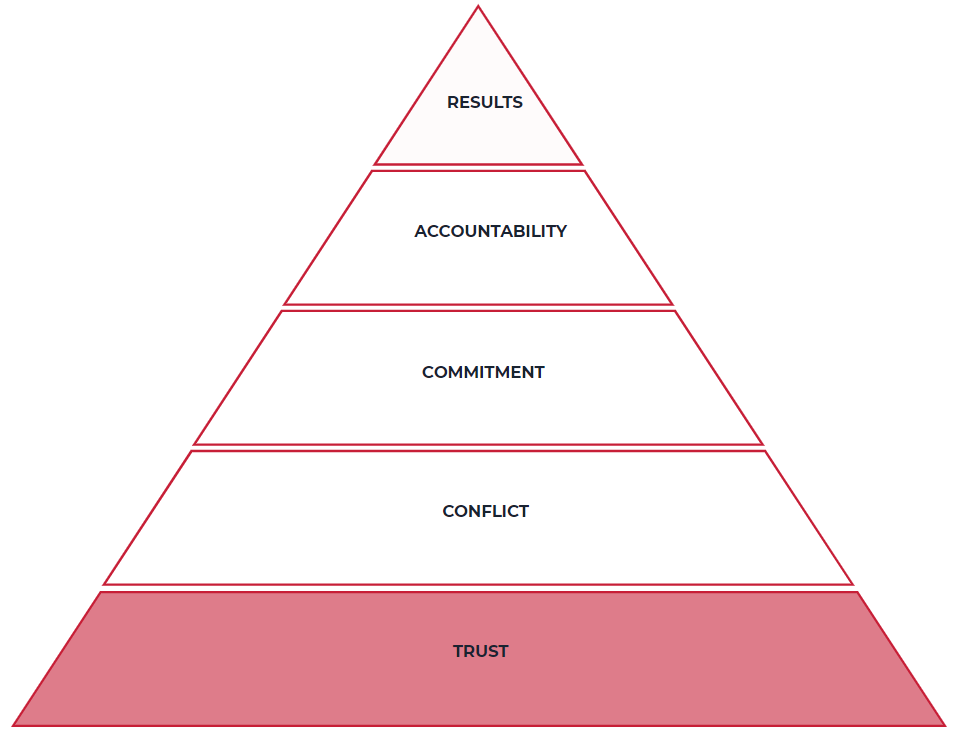
A pyramid is a strong structure. Each layer has fewer stones yet has the strength to support all of the layers above it. Each layer is also simpler than the previous. In his seminal work, The Five Dysfunctions of a Team, Patrick Lencioni uses the image of a Team Health Pyramid to show how the health of a leadership team works and how it is essential to a high functioning organization (one that is accomplishing its goals with a healthy culture).
A Foundation of Trust
The base of the pyramid is Trust. This is vulnerability-based trust that goes deep. Teams with this kind of trust can be open and honest. Conversations become real and are often raw. Team members are so deeply committed to the team and the organization that they will set aside personal preferences and agenda to help the team.
When a team has vulnerability-based trust, they can have (in fact, they welcome) conflict that is healthy and productive. Everyone is heard, ideas are valued, and there is intensity around the unfettered exploration of options and angles. Disagreement and varying perspectives are deemed essential, not something to avoid.
A healthy team has productive conflict that will have members committed to the decision that is made, whether or not that decision was his/her individual preference.
Strength in Accountability
Human beings have a deep need to be heard, and once they are truly heard, they can and will commit to the collective decision of the team. A committed team will also have high expectations about accountability.
Accountability flows readily in both directions. I have courage to hold you accountable and call out you out if you’re not keeping your commitment to the team’s decision. I also welcome being held accountable. I’m so deeply committed to the team that if you show me where I’m not doing what I said I would do, I’m grateful and do whatever I can to correct the shortcoming.
A team that is highly accountable will get the results they desire. They are focused on those results, constantly monitoring progress or lack thereof, and adjusting as needed.
The Cost of Absent Trust
By contrast, unhealthy teams lack vulnerability-based trust. Therefore, they do not have healthy, productive conflict because they are afraid and shrink from disagreement, living in a state of false harmony. Team members are not committed to a decision made without their input or ideas. They sit on the sideline, silently hoping the decision fails so they can feed the “I told you so; you should have asked me” appetite.
Accountability is absent. There’s a lack of courage to hold others accountable and defensiveness if accountability is pointed in their direction. Results suffer due to lack of attention. The energy and focus is on ego, “CYA,” or just staying low so that blame comes to rest on somebody else. Unhealthy teams are doomed to underachievement and turnover.
How EOS Supports Trust Building
EOS, the Entrepreneurial Operating System, has many tools, all designed to increase team health by encouraging, facilitating, and enabling vulnerability-based trust. A few examples:
- The V/TO (Vision Traction Organizer) makes values clear and articulates the vision for the organization.
- The Scorecard makes it crystal clear how results compare to expectations and drive conversations about adjusting when needed.
- The Accountability Chart creates a clear picture of who is Accountable for what. (No room for status and ego, by the way.)
- Rocks (90-day priorities) are established and the entire team commits to achieving them.
- Weekly Level 10 meetings are focused on key numbers and identifying and resolving issues holding back the organization.
Learn more about the EOS Journey to see what many entrepreneurial organizations are doing to help their Leadership Teams become healthy and powerful.
For more on the Team Health Pyramid, read the book The Five Dysfunctions of a Team by Patrick Lencioni. Lencioni uses a fable-based format to create a powerful and compelling read.

